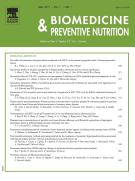Rosmarinic acid, a polyphenol, ameliorates hyperglycemia by regulating the key enzymes of carbohydrate metabolism in high fat diet – STZ induced experimental diabetes mellitus - 13/08/14

Abstract |
Rosmarinic acid (RA) is a polyphenolic phytoconstituent found in many herbs of lamiacea species like rosemary, mint, thyme, basil, oregano. RA exhibits a wide array of benefecial and pharmacological properties including antioxidant, anti-microbial and anti-inflammatory. Oral administration of RA (100mg/kg body weight) to high fat diet fed – low doses of STZ induced type 2 diabetic rats for 30days established a significant (P<0.05) decline in the levels of blood glucose, glycosylated hemoglobin, blood urea, serum uric acid and creatinine along with increase in plasma insulin level. Diminished activities of hepatospecific pathophysiological enzymes such as aspartate transaminase (AST), alanine transaminase (ALT) and alkaline phosphatase (ALP) were observed in diabetic rats administered with RA. Further, the altered activities of key carbohydrate metabolizing enzymes such as hexokinase, pyruvate kinase, glucose-6-phosphatase, fructose 1,6-bisphosphatase, glucose-6-phosphate dehydrogenase, glycogen synthase and glycogen phosphorylase (P<0.05) in the liver tissue of diabetic rats were significantly reverted to near normal levels upon treatment with RA. Also, RA administration to diabetic rats improved hepatic glycogen content suggesting the anti-hyperglycemic potential of RA in diabetic animals. The obtained results were compared with metformin, a standard oral hypoglycemic drug. Thus, the present findings indicate that RA is nontoxic and it can potentially maintain glycemic control and regulate the key enzymes of carbohydrate metabolism in experimental diabetic rats.
Le texte complet de cet article est disponible en PDF.Keywords : Rosmarinic acid, Carbohydrate metabolizing enzymes, Insulin, Glucose, Type 2 diabetes
Plan
Vol 4 - N° 3
P. 431-437 - juillet 2014 Retour au numéroBienvenue sur EM-consulte, la référence des professionnels de santé.
L’accès au texte intégral de cet article nécessite un abonnement.
Déjà abonné à cette revue ?

